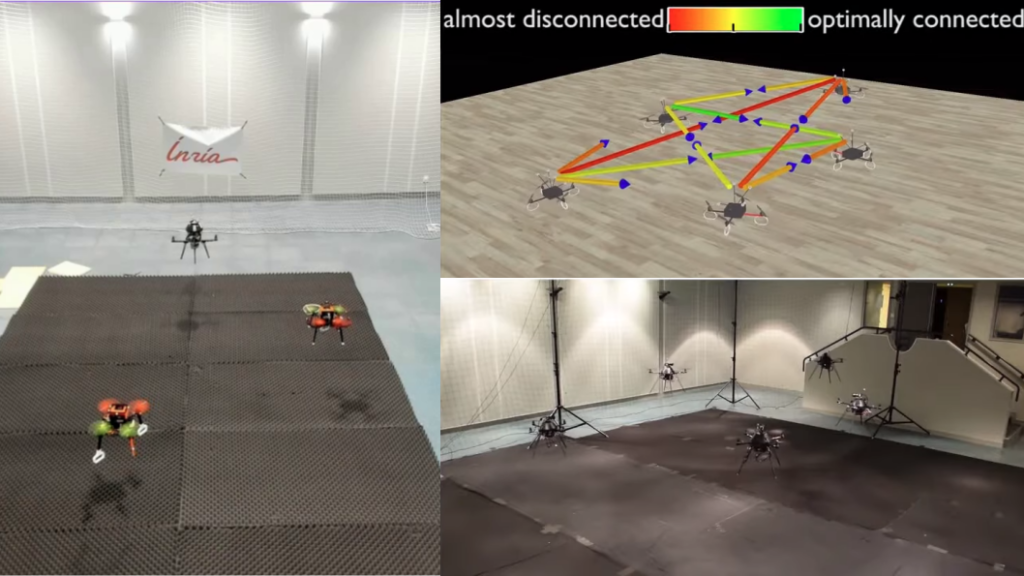Robust Distributed Connectivity Estimation for Human-Multi-Robot Teleoperation
Open research internship position (stage M2)
Short abstract: This Master’s Thesis will investigate a novel distributed algorithm for estimating the algebraic connectivity of robotic swarms, leveraging diffusion models to ensure numerical stability and scalability. The approach will be validated on real hardware in a human-multi-robot teleoperation scenario, ensuring network cohesion under dynamic human guidance.

Hired by the Rainbow team IRISA/Inria Rennes, France
Advised by: Dr. Esteban Restrepo, Dr. Antonio Marino
Contact: esteban.restrepo@irisa.fr – antonio.marino@cl.cam.ac.uk
How to apply: Interested candidates are requested to apply via this form. The position will remain open until a satisfactory candidate is found.
Description and motivation: In the field of Cooperative Multi-Agent Systems, maintaining network integrity is not merely a communication issue—it is a fundamental control constraint. Whether for formation control, collision avoidance, or distributed sensing, a robot swarm must remain algebraically connected to function as a cohesive unit. This is formalized through the concept of “Generalized Connectivity” [1-3], where the graph’s algebraic connectivity (the Fiedler eigenvalue) serves as a real-time proxy for the system’s stability and operational health.
While computing connectivity centrally is trivial, estimating it in a fully distributed manner (where robots only talk to neighbors) remains an open problem for dynamic systems. Current state-of-the-art methods [5][6] rely on distributed power iteration techniques that are numerically fragile. They suffer from slow convergence and require complex parameter retuning whenever the network topology changes—making them ill-suited for real-world deployment.
This challenge is amplified in Human-Multi-Robot Interaction (HMRI). When a human operator teleoperates a fleet of robots (e.g., using a joystick to guide a swarm through a disaster zone), the human’s commands can result in rapid, unpredictable changes to the swarm’s formation. The system requires a fast, robust estimator to alert the controller before the network fractures, ensuring the human can guide the swarm aggressively without breaking communication links.
This Master’s Thesis will develop a novel, adaptive estimation algorithm based on diffusion graph models. Unlike standard consensus approaches, this method will aim to be robust to topological switching, allowing the swarm to self-monitor its connectivity in real-time without constant retuning.
General Objectives: The main goal is to design, analyze, and validate a distributed algorithm that surpasses current methods in scalability, numerical stability, and convergence speed. The student will:
- Develop a distributed connectivity estimator leveraging diffusion models and power iteration that is mathematically robust to dynamic graph topology changes.
- Integrate the algorithm into a human-multi-robot teleoperation framework. The estimator will act as a safety layer, providing real-time feedback to ensure the swarm maintains cohesion while following human velocity commands.
- Test the complete system first in simulation (e.g., ROS2/Gazebo) and subsequently on real robotic hardware, demonstrating the system’s ability to prevent network fragmentation during complex maneuvers.
Envisaged activities
-
Literature review of the related works and familiarize with the current baselines.
-
Develop the methodology and analysis of the theoretical guarantees.
-
Implement and validate in simulation the proposed algorithms.
-
Validate experimentally the scenario on a team of mobile robots.
Skills/Requirements
-
High motivation and interest in the topic
-
Good knowledge in control theory and robot modeling
-
Basic knowledge of control and analysis of multi-agent systems
-
Previous experience with Python/C++ and ROS2
-
Scientific curiosity
Conditions
Expected duration of the internship: 5-6 months
The work will be carried in English at the Centre Inria de l’Université de Rennes research center in Rennes, France.
Financial support offered to the student: gratification de 4,35 € / h
How to apply
Interested candidates are requested to apply via this form.
Supervisor(s): Dr. Esteban Restrepo, Dr. Antonio Marino
References
-
Restrepo, E., & Robuffo Giordano, P. (2024, December). A Distributed Strategy for Generalized Biconnectivity Maintenance in Open Multi-robot Systems. In 2024 IEEE 63rd Conference on Decision and Control (CDC) (pp. 3043-3050). IEEE.
-
Restrepo, E., & Robuffo Giordano, P. (2023). Distributed biconnecitvity achievement and preservation in multi-agent systems. IEEE Control Systems Letters, 7, 3289-3294.
-
Robuffo Giordano, Paolo, et al. “A passivity-based decentralized strategy for generalized connectivity maintenance.” The International Journal of Robotics Research 32.3 (2013): 299-323.
-
Griparic, Karlo, et al. “Consensus-based distributed connectivity control in multi-agent systems.” IEEE transactions on network science and engineering 9.3 (2022): 1264-1281.
-
Yang, Peng, et al. “Decentralized estimation and control of graph connectivity for mobile sensor networks.” Automatica 46.2 (2010): 390-396.
-
Stamouli, Charis J., Charalampos P. Bechlioulis, and Kostas J. Kyriakopoulos. “Multi-agent formation control based on distributed estimation with prescribed performance.” IEEE Robotics and Automation Letters 5.2 (2020): 2929-2934.